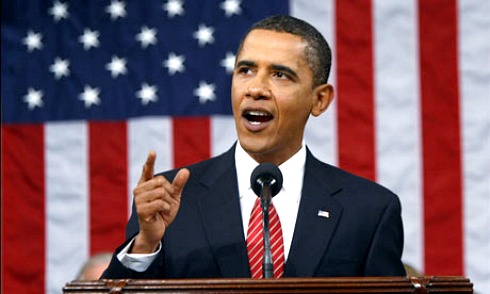Archives
AND MORE...

Our Gift To World Peace
_____________________

Willing to Fight, But 'Not Be Murdered'
_____________________

US Foreign Bungling Policy
_____________________

Surprise!
_____________________

Bunkum, Balderdash & Murder
_____________________
February 11, 2013
Disarming America
According to the New York Times, President Obama will use his State of the Union speech on Tuesday to "reinvigorate one of his signature national security objectives — drastically reducing nuclear arsenals around the world — after securing agreement in recent months with the United States military that the American nuclear force can be cut in size by roughly a third."
First, perhaps someone could tell Mr. Obama that drastically reducing nuclear arsenals around the world is a lofty goal, but until that is achieved, drastically reducing America’s arsenals is downright criminal.
Second, there is something very disturbing about an administration that has yet to show any competency in matters of national security/foreign policy, unilaterally disarming and prowling around for cuts to America’s national security budget. Especially, while arming America's enemies....
As for Mr. Obama “securing agreement in recent months with the United States military,” one can’t help but wonder whom, exactly, represented the U.S. military in this regard?
The New York Times | February 10, 2013
Obama to Renew Drive for Cuts in Nuclear Arms
By David E. Sanger

WASHINGTON — President Obama will use his State of the Union speech on Tuesday to reinvigorate one of his signature national security objectives — drastically reducing nuclear arsenals around the world — after securing agreement in recent months with the United States military that the American nuclear force can be cut in size by roughly a third.
Mr. Obama, administration officials say, is unlikely to discuss specific numbers in the address, but White House officials are looking at a cut that would take the arsenal of deployed weapons to just above 1,000. Currently there are about 1,700, and the new strategic arms reduction treaty with Russia that passed the Senate at the end of 2009 calls for a limit of roughly 1,550 by 2018.
But Mr. Obama, according to an official who was involved in the deliberations, "believes that we can make pretty radical reductions — and save a lot of money — without compromising American security in the second term. And the Joint Chiefs have signed off on that concept."
The big question is how to accomplish a reduction that Mr. Obama views as long overdue, considering that Republicans in the Senate opposed even the modest cuts in the new arms reduction treaty, called Start. The White House is loath to negotiate an entirely new treaty with Russia, which would lead to Russian demands for restrictions on American and NATO missile-defense systems in Europe and would reprise a major fight with Republicans in the Senate over ratification.
Instead, Mr. Obama is weighing how to reach an informal agreement with President Vladimir V. Putin of Russia for mutual cuts within the framework of the new Start — but without the need for ratification. Mr. Obama's national security adviser, Tom Donilon, is planning to travel to Russia next month, officials say, to lay the groundwork for those talks. Mr. Obama and Mr. Putin will hold two summit meetings in the early summer.
Even as he revives a nuclear agenda that has been nearly moribund for two years, Mr. Obama is also expected to try to address new threats.
Within days of the State of the Union address, officials say, he plans to issue a long-anticipated presidential directive on combating cyberattacks aimed at American companies, financial institutions and critical infrastructure like the electric grid. The announcement comes at a moment of heightened attacks from China and, most recently, from Iran.
A lobbying effort by American companies last year defeated a bill in Congress that, in some versions of the legislation, would have required private companies to meet minimum standards of protection and to report attacks to the government. It died over objections that the bill would incur huge new costs and involve the government more deeply into private computer networks.
While Mr. Obama cannot impose the failed bill's mandates by executive order, he is expected to...more here
Log In »
Notable Quotables
"Mr. Netanyahu is one of the most media-savvy politicians on the planet. On Friday he appeared live via video link on 'Real Time with Bill Maher,' taking the host’s alternately sardonic and serious line of questioning with gazelle-like alacrity."
~ Anthony Grant, jourrnalist who has written for many major newspapers and worked in television at Paris and Tel Aviv, interviewing former PM Benjamin Netanyahu on Monday, at the outset of Mr. Netanyahu's new book (more here).


